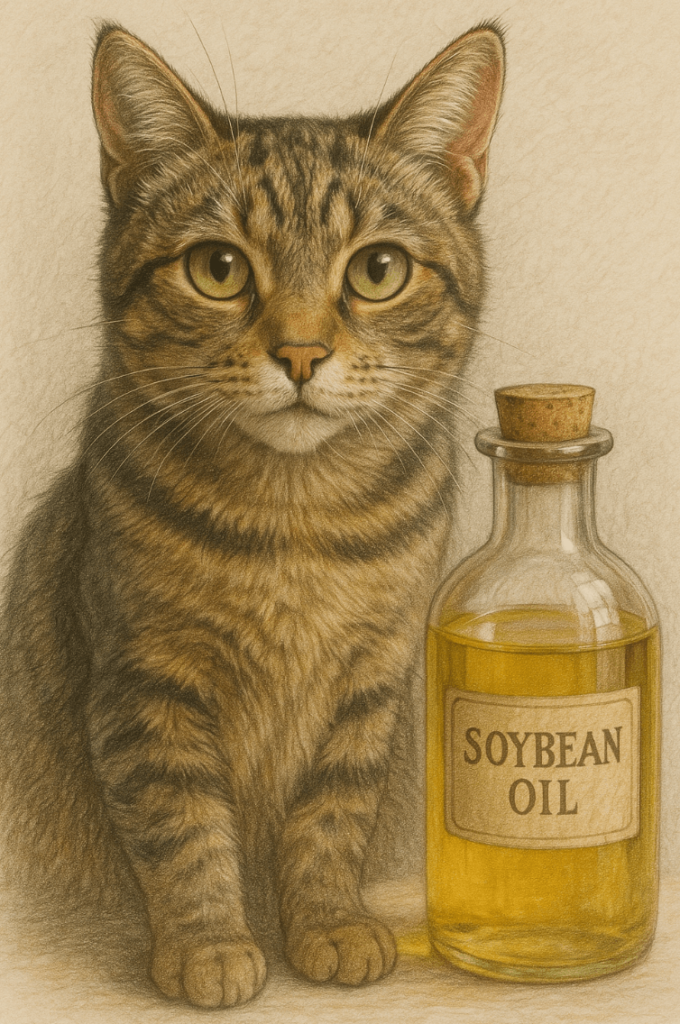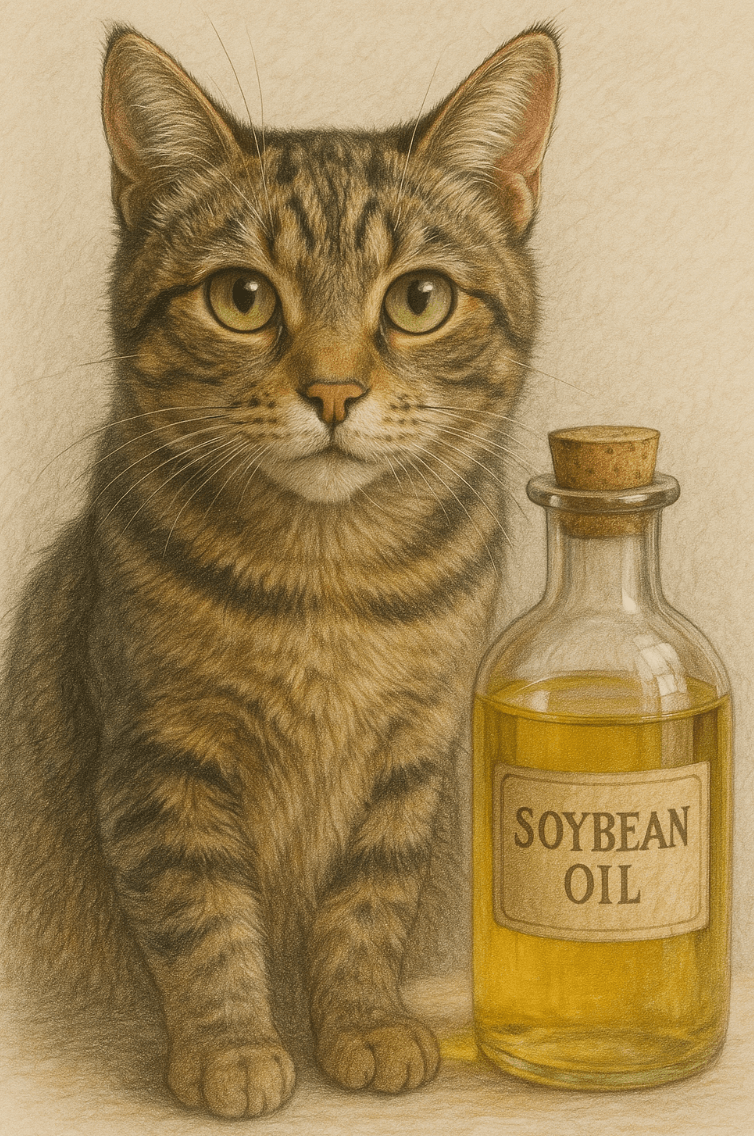Can Cats Eat Soybean Oil?
When it comes to our feline friends, we often wonder which human foods or ingredients are safe for them to consume. One common question that arises is whether cats can eat soybean oil. Soybean oil is a widely used cooking ingredient, but its safety and potential benefits—or risks—for cats are not always clear. Understanding how this oil interacts with a cat’s unique physiology is essential before incorporating it into their diet. In this blog post, we’ll explore the science behind soybean oil, its effects on cats, and guidelines for safe use. Whether you’re curious about its nutritional value or concerned about potential risks, this guide will help you make informed decisions for your furry companion.
Potential Benefits of Soybean Oil for Cats
While cats are obligate carnivores and thrive on animal-based diets, certain plant-based oils like soybean oil may offer some benefits when used in moderation. Here’s what you need to know about the potential advantages of soybean oil for your cat.
Source of Healthy Fats:
Soybean oil contains omega-6 fatty acids, which can support skin health and promote a shiny coat when included in small amounts.Improved Digestion:
A tiny amount of soybean oil may help lubricate food, aiding digestion in cats prone to hairballs or constipation.Enhanced Flavor:
Adding a drop of soybean oil to bland food can encourage picky eaters to consume their meals without compromising their diet.Anti-Inflammatory Properties:
Omega-6 fatty acids in soybean oil may have mild anti-inflammatory effects, benefiting cats with joint issues or allergies.Energy Boost:
Fats are a concentrated source of energy, and soybean oil can provide a quick energy boost for active or underweight cats.
While these benefits exist, it’s crucial to remember that moderation is key—excessive consumption can lead to negative effects.
Risks of Feeding Soybean Oil to Cats
Despite its potential benefits, soybean oil is not without risks, especially when fed in large quantities or over long periods. Here are some concerns to keep in mind before introducing it to your cat’s diet.
High Calorie Content:
Soybean oil is calorie-dense, and overconsumption can lead to unhealthy weight gain or obesity in cats.Imbalance of Omega Fatty Acids:
While rich in omega-6, soybean oil lacks omega-3 fatty acids, potentially causing an imbalance that harms skin and overall health.Digestive Upset:
Some cats may experience diarrhea, vomiting, or stomach discomfort if they consume too much soybean oil at once.Allergic Reactions:
Although rare, some cats may develop allergic reactions to soy products, including soybean oil.Impact on Kidney Health:
Excessive fat intake can strain a cat’s kidneys, particularly in older cats or those with pre-existing conditions.
Understanding these risks ensures you approach soybean oil with caution and prioritize your cat’s well-being.
Check this guide 👉Can Cats Eat Beets? Best 7 Expert Tips!
Check this guide 👉Can Cats Eat Chrysanthemums? Best 7 Expert Tips!
Check this guide 👉Can Cats Eat Coriander? Best 7 Expert Tips!

Safe Uses of Soybean Oil for Cats | Risks of Overusing Soybean Oil |
|---|---|
Small amounts for skin and coat health | Risk of obesity from high-calorie content |
Added flavor for picky eaters | Potential digestive upset |
Temporary relief for hairball issues | Imbalance of omega-6 and omega-3 fatty acids |
Mild anti-inflammatory effects | Strain on kidney function in sensitive cats |
Energy boost for active or underweight cats | Possible allergic reactions in rare cases |
How to Safely Introduce Soybean Oil to Your Cat’s Diet
If you decide to incorporate soybean oil into your cat’s diet, it’s important to do so carefully and responsibly. Follow these guidelines to ensure their safety and comfort.
Start with Tiny Amounts:
Begin with just a few drops (e.g., 1/8 teaspoon) mixed into their food to see how they react.Monitor for Adverse Reactions:
Watch for signs of digestive upset, such as vomiting or diarrhea, and discontinue use if issues arise.Balance with Omega-3 Sources:
Pair soybean oil with omega-3-rich foods like fish oil to maintain a healthy fatty acid balance.Avoid Daily Use:
Limit soybean oil to occasional use rather than making it a regular part of their diet.Consult Your Veterinarian:
Always seek professional advice before introducing new ingredients, especially if your cat has underlying health issues.
By following these steps, you can minimize risks while exploring the potential benefits of soybean oil for your cat.
Signs Your Cat May Be Sensitive to Soybean Oil
Even when introduced cautiously, some cats may show sensitivity or intolerance to soybean oil. Recognizing these signs early allows you to address any issues promptly.
Skin Irritation:
Redness, itching, or rashes may indicate an allergic reaction to soybean oil.Digestive Issues:
Diarrhea, vomiting, or excessive gas can signal that your cat’s digestive system cannot tolerate the oil.Lethargy or Discomfort:
A sudden lack of energy or visible discomfort might suggest adverse effects from ingestion.Loss of Appetite:
If your cat refuses to eat after soybean oil is added to their food, it could be a sign of intolerance.Excessive Shedding:
Unusual shedding or dull fur may indicate an imbalance in fatty acids affecting their coat health.
Recognizing these symptoms helps you act quickly to prevent further complications.
Common Misconceptions About Soybean Oil for Cats
There are several misconceptions about feeding soybean oil to cats. Addressing these myths helps set realistic expectations for pet owners.
Soybean Oil Is a Nutritional Staple for Cats:
Cats do not require soybean oil in their diet, as they thrive on animal-based fats and proteins.It Solves All Skin and Coat Problems:
While it may improve coat shine, it’s not a cure-all and works best alongside a balanced diet.Any Amount Is Safe As Long As It’s Mixed with Food:
Even small amounts can cause issues if a cat is sensitive or if it’s used too frequently.It’s a Substitute for Fish Oil:
Unlike fish oil, soybean oil lacks omega-3 fatty acids, making it less beneficial for overall health.Cats Can Digest Soy Products Easily:
Many cats struggle to process plant-based ingredients efficiently, leading to potential digestive issues.
Clarifying these misconceptions ensures responsible use of soybean oil in your cat’s diet.
Healthier Alternatives to Soybean Oil for Cats
If you’re looking for safer or more nutritious options than soybean oil, consider these alternatives that align better with a cat’s dietary needs.
Fish Oil:
Rich in omega-3 fatty acids, fish oil supports joint, skin, and coat health without the risks associated with soybean oil.Olive Oil:
A small amount of olive oil can aid digestion and provide healthy fats without upsetting your cat’s system.Coconut Oil:
Known for its antimicrobial properties, coconut oil can be beneficial in tiny amounts but should still be used sparingly.Chicken Fat or Beef Tallow:
Animal-based fats are easier for cats to digest and provide essential nutrients they naturally crave.Pumpkin Puree:
For digestive support, pumpkin puree is a natural fiber-rich option that avoids the need for added oils altogether.
These alternatives cater to your cat’s carnivorous nature while offering similar benefits.
Tips for Maintaining a Balanced Diet for Your Cat
A balanced diet is crucial for your cat’s overall health, and understanding how to incorporate supplements like soybean oil responsibly is just one piece of the puzzle. Here are some general tips for ensuring your cat thrives.
Focus on High-Quality Protein:
Cats need diets rich in animal-based proteins to meet their nutritional requirements and support muscle development.Limit Processed Foods:
Avoid cheap fillers and artificial additives in commercial cat foods, as they can harm long-term health.Provide Fresh Water:
Hydration is vital for kidney health; always ensure your cat has access to clean, fresh water.Rotate Protein Sources:
Offering variety in protein sources prevents nutrient deficiencies and keeps meals interesting for your cat.Schedule Regular Vet Check-Ups:
Routine veterinary visits help identify dietary imbalances or health issues early, allowing for timely adjustments.
By following these tips, you can create a strong foundation for your cat’s health and happiness.
Frequently Asked Questions About Cats and Soybean Oil
Is soybean oil toxic to cats?
No, soybean oil is not inherently toxic, but it should be given sparingly to avoid health risks.
Can kittens eat soybean oil?
Kittens have delicate digestive systems; it’s best to avoid giving them soybean oil unless advised by a vet.
How much soybean oil is safe for cats?
A maximum of 1/8 to 1/4 teaspoon per day is generally considered safe for most adult cats.
Does soybean oil help with hairballs?
Yes, in small amounts, it can lubricate the digestive tract and reduce hairball formation.
What are better alternatives to soybean oil?
Fish oil or olive oil are healthier options for cats, as they provide balanced fatty acids and additional nutrients.
Prioritizing Your Cat’s Health When Using Soybean Oil
While soybean oil can offer some benefits for cats, it’s not a necessity in their diet and should be used with care. Understanding its potential advantages, risks, and proper usage ensures that you make decisions aligned with your cat’s unique needs. Always prioritize consultation with your veterinarian before introducing new ingredients, and monitor your cat closely for any adverse reactions. By staying informed and cautious, you can ensure your feline friend enjoys a healthy, balanced diet without unnecessary risks. Remember, the key to a happy cat lies in providing them with the nutrition they truly need.
Pemphigus Erythematosus in Cats: Best 7 Expert Tips! – Learn to recognize symptoms, manage flare-ups, and improve your cat’s quality of life.
Pemphigus Erythematosus in Dogs: Best 7 Expert Tips! – Discover causes, symptoms, and treatment options to manage this autoimmune skin condition effectively.
Cat Tympanic Membrane: Best 7 Expert Tips! – Learn how to protect your cat’s eardrum, spot issues early, and ensure lifelong auditory health.
Dog Tympanic Membrane: Best 7 Expert Tips! – Learn how to protect your dog’s eardrum, spot issues early, and ensure lifelong ear health with expert advice.





